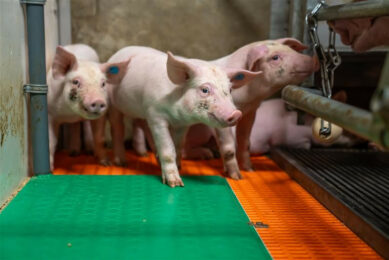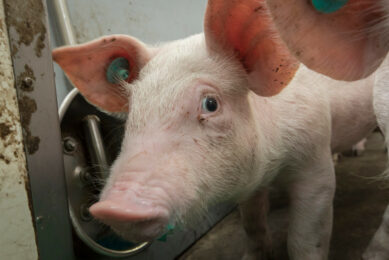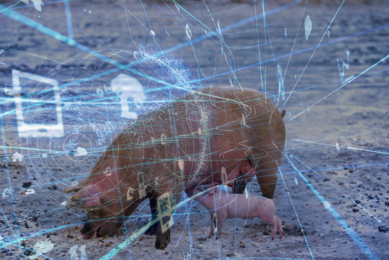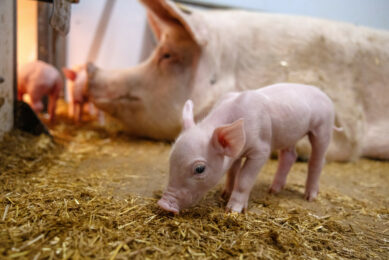Quality colostrum boosts immunity transfer
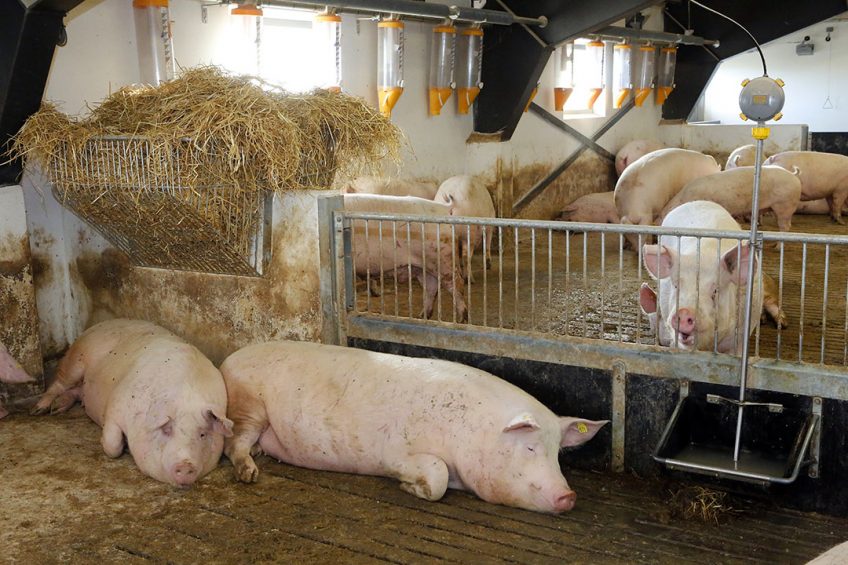
Colostrum consumption is crucial for piglets to survive lactation. Traditionally, the efficiency of the immune system has been evaluated by farm veterinarians rather than by nutritionists. Recent publications identify dietary ingredients modulating immune functions, which point to new perspectives for nutritional strategies.
Piglets are partially immunocompetent from the moment they are born, more specifically from day 70 of gestation. But this ability is not yet fully developed and appears immature both during birth and afterwards. Therefore, complete protection for piglets is ensured by the exposure of piglets after birth to high levels of pathogens, forcing their immune system to mature and become fully competent in a very short period of time, and by the passive transfer of antibodies from the mother, through the colostrum, thanks to the action of specific hormones during peri-birth (see Figure 1).
Figure 1 – Piglets are partially immunocompetent at birth.
This transmission of maternal antibodies is crucial, as the type of placenta in sows (epitheliochorial) is radically different to the placenta of humans or primates. It doesn’t allow for the transmission of any type of immunoglobulins. Nevertheless, piglets already have antibodies in their bloodstream at birth; they generate these antibodies themselves after having been in contact with antigens during the final month of gestation. These antibodies generated by the foetus are not enough to adequately protect it after birth. This has led to a range of different vaccination strategies for sows in order to boost the generation and transmission of antibodies via the colostrum, which will then be consumed by piglets after birth. The piglet is highly dependent on the colostrum for protection, and piglets that die during peri-birth, have a lower serum level of antibodies.
Colostrum: source of immunoglobulins
The colostrum contains a battery of defence cells to help the piglet survive. The level of immunoglobulins in the colostrum is 60 times higher than in the milk. Around 65-90% of these immunoglobulins consist of the IgG type, which provides systemic protection. The absorption of these IgG immunoglobulins by piglets is not selective; they are present in the plasma 2 hours after colostrum ingestion and peak at 12 hours. The immunoglobulin profile of colostrum is dependent on the antigens that the mother is exposed to.
During lactation, IgG immunoglobulins are progressively replaced by IgA, which functions to protect the intestinal mucus of the piglet. This is especially interesting, given that during this period, the intestine is the main target organ for many pathogens, such as E. coli.
Given the enormous complexity of the factors which influence the generation and assimilation of colostrum, the pig farming sector has implemented a series of strategies. One such strategy is immune-adaptation in sows. This is achieved by the controlled exposure of sows during their development towards becoming future mothers. This process trains the immune systems of the sows to recognise the antigens, and respond to them by producing antibodies, which can then be transferred to piglets via the colostrum. Vaccinations are given to first-time mothers in order to acclimatise the sows to the bio-system of the farm. This acclimatisation continues with further vaccinations during the period of gestation, with the goal of stimulating the generation of antibodies that will be passed on to the newborns through the colostrum.
Sow vaccination provides protection
Whilst E. coli is the main problem encountered on farms with reproductive sows, this is not the only pathogen which piglets must be protected from. The main vaccination programmes depend on the type of pathogen and the capacity of the antibody generated to reach the target tissue of the piglet, where the pathogen is active (see box).
Main vaccinations for reproductive sows
Note: According to local epidemiological specificities: Glasser and Parovirus. |
Therefore, depending on the situation, sows may require a double or even a triple vaccination, and the piglets will also need to be vaccinated, even though there may be relative competition (the so-called ‘inference by the mother’s immunity’) between maternal passive immunity and that generated by the piglet itself.
The immunity generated by the newborn piglet may be partially inhibited by the presence of maternal antibodies from the colostrum, or it may only develop later, or its development may be altered. This situation creates a dilemma for veterinarians: how far should they go with colostrum protection? Precisely because of this dilemma, the evaluation of the serum content of antibodies in the early life of piglets, along with an estimation of the rate at which these antibodies disappear, can help correctly identify the most appropriate moment for the first vaccination. However, the ultimate objective is clear: increasing the number of plasma antibodies in the sow’s blood and transmitting them to the colostrum is vital. The level of antibodies in the piglet is proportionate to the level in the colostrum, and the survival of the piglet is directly related to it. This is the only way to maximise the protection of the animal when it is exposed to pathogens.
Boosting the immune system through nutrition
Recent publications have identified dietary ingredients that can modulate the immune system to reveal a new nutritional approach to enhance the generation of antibodies in gestating sows and to boost vaccination programmes.
Numerous published studies have highlighted the benefits of low-dose phytonutrient supplementation to modulate the immune system in several different animal species. Among the promising phytonutrients identified, 2 of them are of particular importance and reveal a synergistic effect when used in combination.
- The first is curcumin, which is found in turmeric oleoresin, and has been used for centuries in Indian and Chinese medicine. It enhances and accelerates antigen recognition by the host, and therefore favours the generation of appropriate antibodies. However, curcumin supplementation is associated with the challenge of low bioavailability, which can be successfully improved by the addition of a second dietary ingredient: capsaicin.
- Capsaicin: A high quality and sufficient quantity of capsaicin can be added to animal feed in the form of the chilli pepper oleoresin. In addition to increasing the bioavailability of curcumin, this ingredient is also known to exert a strong anti-inflammatory effect, via stimulation of the gut TRPV1 receptors, thus triggering a whole range of beneficial physiological responses. However, its physical properties make capsaicin an irritant and difficult to handle ingredient, necessitating the proper micro-encapsulation of capsaicin together with curcumin into a matrix that is safe, easy to handle and use.
The interest generated from these studies led to the evaluation of a feed additive consisting of turmeric and chilli pepper oleoresins (XT-Xtract Nature) in feed, and as an adjunct to vaccination programmes by the United States Department of Agriculture (USDA) Animal Parasitic Diseases Laboratory in 2011. Results in poultry have demonstrated a boost in the efficiency of the coccidiosis vaccine and an increase in the pool of antibodies produced. Beyond exerting a local effect, the additive’s positive benefits included a systemic and global protection in the animal against coccidiosis (parameters were measured in spleen and peripheral blood).
These results provided the foundation for further studies. The application and development of such strategies in animal species other than poultry relied on the use of comparative physiology of the species.
A more recent field trial aimed to extend this research programme to swine, to determine if the dietary additive could enrich gestating sow serum antibodies during vaccination and if these antibodies could be transferred through colostrum and milk, to impact piglet immunity and survival at weaning. The trial was held in Spain by Tamaporc in Aragon, Spain, in collaboration with Avena Nutrition, a leading Spanish animal nutrition company.
The trial was carried out in 3 consecutive phases.
- Phase 1 and 3 were the control phases.
- The additive was given in the second phase to a total of 673 gestating sows divided in 2 groups, and was supplemented at a dose of 200 g/t , as an adjunct to the sow vaccination programme (colibacillosis vaccination at day 80) from day 80 of gestation for a period of 30 days.
Trial findings
The positive effects of the supplementation were first observed as an increase in the percentage of piglets born alive (+1.9%; P-value = 0.002), before the piglets even started to ingest the enriched colostrum produced by the sows. The colostrum quality was found to have a higher content of total proteins, which consisted of both increased levels of albumin and the sum of globulins (see Table 1).
Piglets from supplemented sows received a better quality of colostrum during their first days of life, and consequently encountered lower mortality rates during the suckling period (see Figure 2). It was interesting to note that this effect was particularly noticeable in sows following their first 2 parities.
Colostrum at the crossroads
Immunity in farm animals has traditionally been of greater concern to farm veterinarians and is a key factor impacting the profitability of farmers. While vaccination strategies to acclimatise sows to the bio-system of the farm have already demonstrated beneficial effects on improving the colostrum profile for piglets, new strategies recently arose to satisfy persistent challenges. Some of these options can now be directly handled by nutritionists through feed, as well as accompanying the work of veterinarians. They consist in supplementing a low dose of a defined combination of phytonutrients in order to boost the generation of serum antibodies in gestating sows, which can then be transferred to the colostrum. The resulting enriched colostrum provides piglets with an immune-boost from their first day of life that will guarantee a smooth transition to their next productive phase. This already strategy demonstrated beneficial effects in various animal species.




